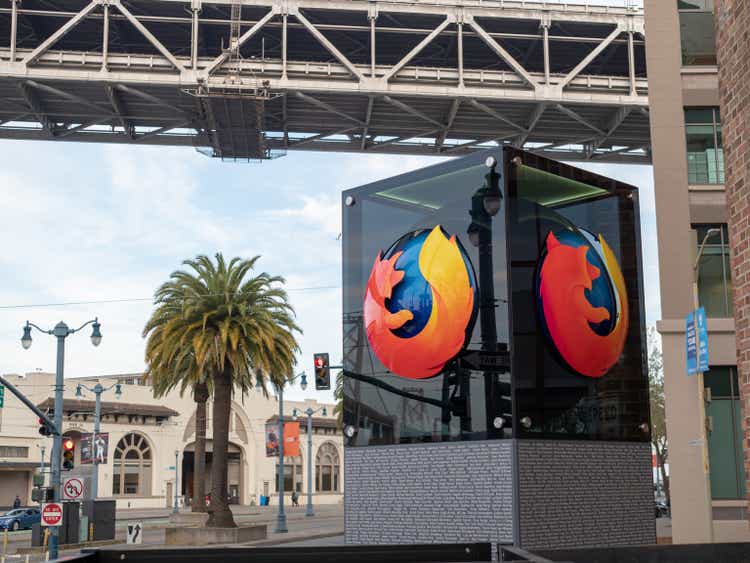
David Tran/iStock Editorial via Getty Images
Exactly 20 years ago, Mozilla announced the worldwide availability of version 1.0 of its Firefox browser. Born from the demise of the world’s first commercial browser, it went on to corner over 30% of the market at its peak in 2009.
But Firefox’s growth stagnated, and it was unable to hold its own against the faster and lighter Google (NASDAQ:GOOG) (NASDAQ:GOOGL) Chrome, with its market share reducing to 4% in 10 years.
However, the spiritual successor of Netscape Navigator, continues to be an important part of the browser ecosystem, with its focus on privacy and creating an open community.
The Mozilla Foundation, the parent of the Mozilla Corporation, describes itself as standing up “for the health of the internet.”
And the company has stated that it will refocus its product strategy around Firefox and artificial intelligence and significantly scale back or even shutter other efforts.
From the Ashes Rose the Red Panda
As Netscape Navigator fought a losing battle with Microsoft’s (NASDAQ:MSFT) Internet Explorer, Netscape decided to open source its codebase and created the not-for-profit Mozilla Foundation in 1998, which created the Firefox browser in 2002.
In just one year after its launch in 2004, Firefox hit over 100 million downloads. The browser gradually grew its market share to a peak of 32.21% in November 2009, with Firefox 3.5 overtaking Internet Explorer 7.
But Firefox’s growth soon stagnated, and it was unable to compete with Chrome. In 2020, Mozilla announced that it would slash 25% of its worldwide staff of nearly 1,000 to trim costs.
Mozilla’s focus seemed to have strayed from its core product, the browser, to a multitude of products including a mobile OS called Firefox OS and a web-based identity system called Mozilla Persona. Both of those projects were eventually cancelled.
As of October 2024, Firefox held a meager 2.65% market share across all platforms compared to Google’s (GOOG) (GOOGL) mammoth 66.68%, Apple (AAPL) Safari’s 18.07%, and Microsoft (MSFT) Edge’s 5.25%.
Firefox has struggled even more on mobile, with a measly 0.51% share of the market. While the Firefox app’s following is small, it remains an important alternative option for users looking beyond the Big Tech giants.
Mozilla is also heavily financially dependent on its search deal with Alphabet’s Google (GOOG) (GOOGL), which might come undone given the U.S. Department of Justice’s scrutiny of such deals.
Down But Not Out
After appointing board member Laura Chambers as the chief executive earlier in the year, Mozilla announced its refocus on the browser and AI.
According to a Tech Crunch report, the not-for-profit company reduced its investments in a number of products, including its VPN, Relay and its Online Footprint Scrubber.
The report, citing an internal memo, added that Mozilla shut down Hubs, the 3D virtual world it launched back in 2018, and scaled back its investment in its mozilla.social Mastodon instance.
“I’ve been in enough places where people tend to forget about the core business, and they stop investing in it, because they get distracted by shiny things — and then they regret it,” said Chambers in an interview with Tech Crunch.
“I’m very determined that that’s not what we’re going to do here. Firefox is incredibly important, and it is our core. We’ve actually put more investment into it this year,” Chambers added.
Here are some exchange-traded funds of interest tied to technology, AI and robotics: (VGT), (XLK), (IYW), (FTEC), (IXN), (RSPT) (AIQ), (BOTZ), (DTEC), (GINN), and (ROBT).
